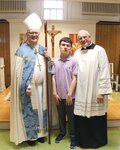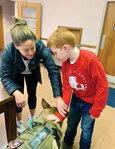By Jennifer Barton, Rhode Island Catholic Correspondent
WARWICK — How does one teach the truths of the Faith to a child who may not be able to speak, much less comprehend the inscrutable mysteries of the Supreme Being – as if any one person truly can? Yet the pews of Catholic churches contain more than a mere handful of people with autism, both children and adults. Since the discovery of this neurological spectrum disorder, the numbers of children diagnosed with autism has skyrocketed to the point that now one in 36 live each day with it.
Teaching children with autism comes with different challenges than typical children or even those with other disabilities, but these members of the Catholic community need religious education as much as their counterparts. Margaret Andreozzi, Faith Formation Coordinator at St. Peter Parish in Warwick, oversees the Autism and the Sacraments program at her parish.
“The one thing we’ve found over the years is that sometimes we find that parents of a child with autism … it’s more important for them than for a parent with a typical child. And that helps us feel that we need to do something,” Andreozzi observed.
Not a new ministry in the Diocese of Providence, the St. Peter Autism and the Sacraments program restarted last October after a brief hiatus due to the pandemic. Prior to 2020, the program had continued nonstop for 12 years, starting in 2008. During those years, around 50 young students received their first Holy Communion and roughly 25 of those have been confirmed, according to Andreozzi. This year, eight students are enrolled in the program.
While Andreozzi originally recognized the need for an autism-specific religious education class after attending a workshop at Bryant College in 2007, she credits its inception to her pastor, Father Roger C. Gagne, who agreed to starting the program. “If we hadn’t had Father Gagne’s support, it would have never got off the ground,” she commented. He comes to the every-other-week sessions to get to know the children and their families.
The students learn through a highly visual curriculum created specifically for the autistic mind, using icons and the Picture Exchange Communication System (PECS). Andreozzi explained that the program is tailored to meet their educational needs, different than those used for children with other disabilities.
“We’re going to try and teach your child in the way they know how to learn,” she said, “and that’s why we feel it’s working and has worked for so many years.”
Without its dedicated team of volunteers, the parish could not keep the program going. Andreozzi reports that 90% of these volunteer teachers “are from the autism world” — teachers, aides, etc., who understand the literal and visual mindset of a person with autism. Any volunteer that might not have that same level of experience receives training right at the parish. The ratio of children to adult volunteers is high, roughly a 1:1 ratio.
A special volunteer
One volunteer has four legs and fur. Callie, the 125-pound, German Shepherd-St. Bernard therapy dog, greets students biweekly with kisses. Her owner, Mary McNulty, a parishioner at St. Peter, is a retired chemistry teacher who takes this “great opportunity” to help others during her retirement.
Callie came from a shelter in Tennessee which rescues German Shepherds. Though her early life may have been rough – as evidenced by a missing tail — Callie’s sweet temperament makes her an ideal therapy dog. McNulty hadn’t planned to train her dog for this, but after seeing the gentle, caring way Callie behaved with her elderly mother and noticing a passel of therapy dogs at Providence College during finals week, she decided to investigate the possibility. Three semesters with Windwalker Professional Pet Assisted Therapy allowed Callie to receive her credentials last June. During her training, she and McNulty visited group homes to interact with mentally and physically disabled people, which the pair still does three times a week.
And the response they get is astonishing.
“At first, people are a little intimidated by her because she’s so big,” McNulty said, “and usually one person will take the initiative to want to be close to her and then within a short period of time, everyone wants to be with her.”
Whatever situation McNulty and Callie find themselves in, they adapt to it in order to provide comfort and a calming presence. At church, McNulty learned about the autism program and reached out to Father Gagne about bringing Callie. She recalled that he was “very receptive” to the idea, even taking Callie into the church to show her where she would be working. Callie is so loved and accepted that she was invited to an upcoming first Communion Mass for two students in the program.
The children aren’t the only ones to benefit from Callie’s presence at the St. Peter Autism and Sacraments program. McNulty does, as well. She related a story of the first boy who interacted with Callie. His mother hadn’t expected him to engage with the canine at all, so to see her son hugging Callie surprised her. Another boy wanted time with Callie rather than a cookie to reward his hard work and yet another painted Callie a picture, though he took it home with him.
McNulty knows her canine companion can motivate the kids even on hard days.
“You know, dogs are so unconditional, and they accept everyone, and I think that’s what makes all the people that she’s involved with feel good,” she said. “They feel good about themselves that she wants to be with them and loves them, too.”
Grace through adversity
Participants in the program come from various parishes beyond St. Peter, even from Massachusetts, as their parents know that this program best fits their child’s spiritual needs.
Sharon Moitoso learned about the program when her twin sons, Jack and Sam Brantolino reached the age to prepare for first Holy Communion. While Sam is considered neurotypical, Jack had severe autism and was nonverbal. Sadly, Jack passed away last year on April 13, due to a seizure. He was 19.
Moitoso fondly remembered Jack, remarking that although his cognitive impairments were severe, “he was so lovable and had a good sense of humor. I think it’s hard for people to see that when they see someone who’s nonverbal.”
Jack had a fondness for music and sand pails; he hated getting dressed up and only wanted to wear the color gray. He experienced the same sensory issues many people with autism do and communicated mostly through an iPad.
The family belonged to St. Matthew Parish in Cranston, but when Moitoso learned that the religious education program she signed Sam up for couldn’t support Jack, she was devastated. Then she learned about St. Peter’s Autism and Sacraments program and signed Jack up.
“Jack really, really loved it,” she stated. “He really looked forward to it, he never complained, he liked the people. I think he understood everything even if he wasn’t able to talk.”
The truths of the faith should be accessible to both of her boys, Moitoso believed, and having a program that taught her son in a way that he understood was meaningful. She had wanted them to learn together. “How do you explain to them that they’re equal in the eyes of the Lord? It’s not just for one of them.”
Moitoso and Jack had developed such a close bond through the program that when he passed away, she chose to hold his funeral at St. Peter, where Father Gagne celebrated a sensory-friendly Mass that Jack’s friends would be comfortable attending. Indeed, several of them did come to pay their respects.
Knowing that Jack received his sacraments brought a special comfort to his mother after his passing. Though she reflected on the importance of these graces while he lived, she added that, “it was even more important when Jack died. I can’t even imagine if he passed away and he hadn’t received his first Communion or confirmation.”
A church community
Part of the program’s strength is that while the children learn, their parents remain at the parish. This leads to conversations with other Catholics in similar situations, forming a community bond. This happened for Sue and Tom Sienkiewicz, also members of St. Matthew in Cranston. Like Jack, their son Andrew’s communication skills are limited, though he can read and spell many words and understands a great deal. “He has a really delightful personality. He’s one of those easygoing individuals,” Sue remarked.
Even so, taking him to Mass, even early on, proved difficult. He had aggression issues as a toddler until applied behavioral analysis (ABA) helped extinguish most of those. Sue typically took him to the cry room at church – which proved more frustrating than fruitful – and later enlisted a babysitter so that she and Tom could attend Mass with Andrew’s older brothers, distraction-free.
Only by happenstance did they end up taking him back to church one day, “and he didn’t act out, he was perfect.” That got Sue thinking, “I would love for him to be able to receive Jesus in the Eucharist.”
She got Andrew involved in SPRED, the diocesan religious education program for people with disabilities, and not long after, she learned about the new ministry starting up at St. Peter, “and I was all in.”
Andrew began attending the program, which exceeded Sue’s expectations. In the meantime, she connected with other parents and to this day, still meets with another mom from the program, taking their sons for lunch. Andrew aged out of the program after confirmation, though Sue wanted him to continue. Sadly, the parish didn’t have the resources to continue beyond sacramental preparation. However, they did host an annual Advent Mass, inviting all families to return.
“Everybody who has been through it feels a connection to one another,” Sue said.
In that way, the program proved a double blessing, though she knows its true purpose. “It really was an answer to prayer because I wanted my son to make his sacraments,” she said.
The day Andrew did receive Jesus in the Eucharist at a Mass celebrated by Father Gagne, Sue remembers, “my heart was so full, I felt like it was beating out of me, and I was just in tears. I tried to contain myself, but I couldn’t.”
She believes that the Catholic Mass, unchanging throughout the world, appeals to people with autism because of its structure as well as the way it engages the senses. She proudly relates that she can take Andrew to any Catholic Mass in the world, and he would behave wonderfully – and, thanks to St. Peter Autism and Sacraments program, can receive the Eucharist.

